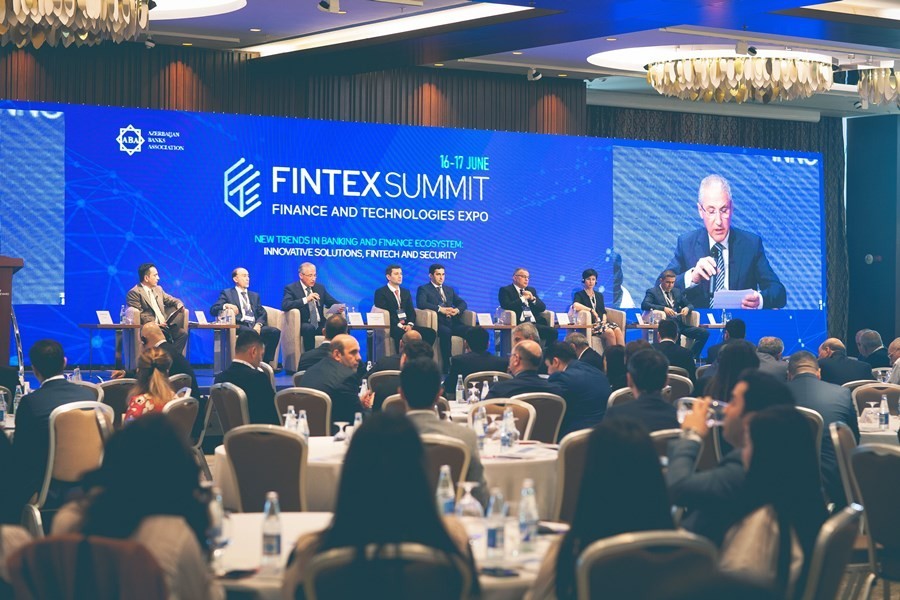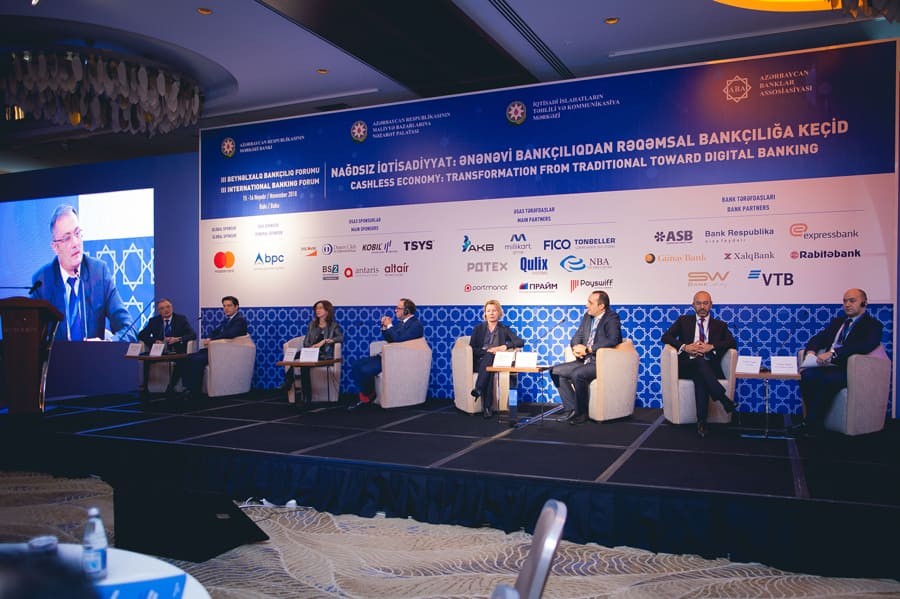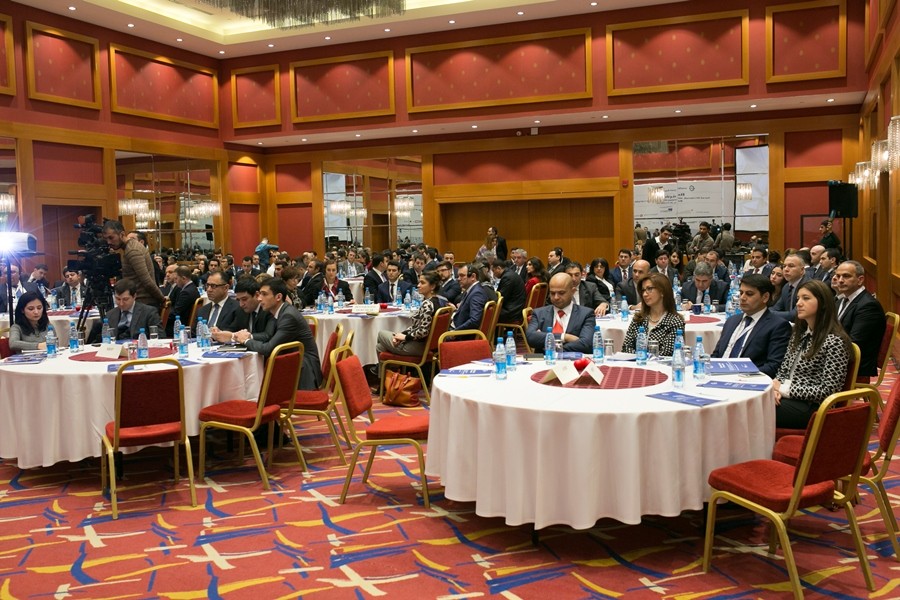
The results of the Fintex Summit in Baku
Progress in the digitalization of Azerbaijan is evident
During both days (June 16-17, 2022) of the Baku Fintex Summit, its participants – representatives of banks, financial and government structures, as well as fintech companies – not only drew a line under the obvious successes of digitalization in Azerbaijan, but also outlined the circles of its near development – urban mobility, security, and corporate social responsibility.
In 2022, the event, considered one of the most important events for the field of finance and banking in the entire region, focused on banking and the financial ecosystem. The Fintex Summit was supported by the Azerbaijan Banks Association, the Central Bank of Azerbaijan, the Ministry of Digital Development and Transport, and other organizations. The global company Visa has become a key sponsor of the event. The media partners of the event were the magazine "PLUS" and the portal PLUSworld.ru. Special attention was paid to innovative solutions, fintech, and security.
Cristina Doros, Vice President and Regional Manager for Azerbaijan and Central Asia at Visa, noted in her opening speech that the company is doing everything possible in the country to "break down barriers between fintechs, banks and other financial institutions."
"Small and large businesses are experiencing various waves of economic shock," she addressed the summit participants. "Banks and financial institutions have to overcome barriers to expand and accelerate their technologies, and it's time for Visa to introduce new solutions to help and support businesses, financial organizations and fintech companies." As Cristina Doros pointed out, Visa has many improvements to help the financial ecosystem, including the implementation of tokens (VTS), Apple Pay, solutions for SME Visa Tap to Phone, and etc.
After the welcome speeches panel discussions started.
Intelligent data. Neobanks
Sergei Yevtushenko, Deputy Director of the DIS Group Consulting division (offices in Russia and Kazakhstan), said that three trends are indisputably dominant globally in Intelligent Data: self-confident business leadership, artificial intelligence, and machine learning.
"The chief data officer must adapt to the current changes in priorities and lead the team and the organization to a data-based future," S. Yevtushenko advised the summit audience.
Evgeny Lisnyak, responsible at Visa for the development of strategic and venture partnerships in Ukraine, Georgia, Central Asia, and the Caucasus, focused on the financial ecosystem of the state and said that certain conditions must appear in order to achieve success in this area, primarily regulatory and external. According to the speaker, Azerbaijan has something to boast about: the country's Central Bank not only supports digitalization but also presented a digital payments strategy for 2022–2023. In the same year, the regulator signed a cooperation agreement with Visa to promote digitalization.
According to E. Lisnyak, the COVID-19 pandemic has contributed to the development of the country's online payment system at a faster pace: "Embedded finance is becoming ubiquitous. Banking is becoming available everywhere." He also said that he considers the Azerbaijani railways "an icon of rapid digitalization" (as it is known, its passengers are able to pay for travel by cards).
E. Lisnyak disclosed statistics about the extent of digitalization of republican citizens' financial behavior in the end of his speech. In 2021 alone, 11.5 million cards were issued, and 65% of them were contactless. Simultaneously, their number has increased by 20% (contactless - by twice). 17% of non-bank citizens are ready to order a card in the next 6 months.
"Metaverse unites different digital worlds and promotes further innovations in the field of payments. We see a lot of potential in this, and we need to keep a watchful eye on it. Perhaps it will be the next big thing," concluded E. Lisnyak.
From the financial ecosystem to digital neobanks
As a phenomenon, neobanks appeared just 10 years ago, but they began to scale only in recent years," Benjamin Wellstein, partner of the landing and banking practice of Simon-Kucher & Partners, said in his speech. And even despite this progress, the digitalization of banking is noticeably lame.
"In recent years, we have seen a rapid leap in the opening of new neobanks," commented B. Wellstein. "Often they open under new names and are subsidiaries of the main bank." The speaker cited a couple of exemplary neobanks: Emirates Lifestyle, created for the digital generation, and Bankcolombia, where 82% of customers are men and women aged 18–35.
The focus is on the token
Alexander Stelmakh, Senior Director and Head of Visa's Digital Solutions Department in Ukraine, Georgia, CIS countries, and South-Eastern Europe, focused his speech on new opportunities for the digital user experience of Azerbaijani residents.
"According to data from the local Central Bank, the number of eCommerce payments climbed by more than half in 2021 when it comes to the Azerbaijani economy. This is a huge leap. And in 2022, we also expect serious growth in it. Everything that has a digital basis is accelerating," A. Stelmakh noted, and added that the Visa payment system is always ready to provide the possibility of such payments.
Next, the speaker paid special attention to tokenization, a technology that replaces confidential customer data with a 16-digit number, which makes payment secure. A. Stelmakh said that at the moment 193 countries have given permission to tokenization, and this number is growing. In addition, more than 2 billion tokens have been issued.
"Tokenization allows a completely new payment experience via your phone, watch, and, possibly, your car in the future. It makes it possible to make simple and safe purchases in eCommerce," added A. Stelmakh. "In 2021, we successfully launched Apple Pay in Azerbaijan, and now we see the growth of transactions using this technology. But still, if we speak about eCommerce tokenization, Azerbaijan is taking the first steps, so a breakthrough should be expected here."
Proactive Regulator
The future of payments in Azerbaijan was the subject of the speech of Rashad Gasimov, Senior Specialist of the National Payment Systems Development Department of the Department of Payment Systems and Settlements of the Central Bank of Azerbaijan. The representative of the regulator said that in 2021, compared to the 2020 fiscal year, 20% more bank cards were issued (11.5 million and 9.6 million, respectively); the number of POS terminals increased by 7% (61 thousand and 57 thousand devices), and the number of contactless POS terminal devices by 28% (44 thousand and 34 thousand).
This evolution has led to the fact that digital banking is becoming increasingly popular in Azerbaijan: according to the regulator, in 2021 it accounted for 73% of client transfers.
In order to promote further growth of the country's financial sector, the Central Bank of Azerbaijan plans to implement a five-point strategy by 2023:
- to improve the legislation on digital payments (in particular, digital currency and e-banking);
- to expand the coverage of the infrastructure for digital payments (to implement the ISO 20022);
- create a payment ecosystem regulatory framework (API standard, QR codes, and stricter cybersecurity requirements);
- increase the level of digital payment inclusion (preparation of the digital manat concept and launch of the e-KYC system);
- to promote the development of digital literacy and the popularity of digital payments among all segments of the population of Azerbaijan.
Eventually, the ecosystem of digital payments in the country will develop only with the proactive position of all its participants, thinks R.Gasimov. At the same time, not only the Central Bank, banks, and AzerPost, but also fintechs, global payment organizations, and processing centers are considered important elements of this formation.
According to the general opinion of the speakers and participants of the event, there are all the necessary prerequisites for the further digitalization of Azerbaijan: the assistance of the Azerbaijani government, the readiness of banks, and global payment partners such as Visa.
Payment security and Social Engineering
The second day of the Fintex Summit began with the topic of security. First, the speakers discussed what mandatory actions should be taken by the players in the financial sector of Azerbaijan in order to guarantee its security and effectively combat fraud.
"It's no secret that the pandemic has caused a sudden acceleration in the e-Commerce and mobile commerce segments," Charles Lobo, Senior Vice President and Director of Risk Management (Visa, CEMEA)", said from the stage. "We have witnessed the acceleration of digitalization at all levels at a speed unthinkable for eCommerce. While the volume of payments consistently showed a growth trajectory, the percentage of fraud remained extremely small."
Lobo shared with the participants five trends in post-pandemic risk management and payment security (from the point of view of emitents):
1. The volume of ecommerce payments is growing rapidly, and the level of fraud remains at a low level
2. The level of tokenization has increased by 100%, so customers have gained a secure and seamless payment experience. "It has proven its advantages in the security sector by devaluing sensitive information. This means that sensitive data such as card number, CVV, etc. has lost its appeal to cybercriminals. Because during tokenization, your card number is simply replaced with a token," the expert noted.
3. The 3-D Secure platform has grown by 85%. Coincidently, the level of fraud has fallen by 3 times against the background of the general CNP (Card-Not-Present transactions).
4. Contactless payments continue to grow at a rate of +20% per year and now dominate F2F payments (face-to-face) with a level of fraud close to zero
5. Social engineering (SI) remains a challenge for many global and local markets. "SI is the dominant approach where fraudsters deliberately attack consumers. Visa has invested heavily in educating and informing consumers, as well as working with partners from banks, credit institutions, and the government to raise awareness of attacks based on social engineering." commented the speaker.
The next speaker, German Pozankov, Managing Director of Trendmicro in the CIS and Mongolia, also focused on digital security.
In response to the topic of what the fundamental issue with managing digital security is, Pozankov stated that "digitalization... enables enterprises to offer new services and be more competitive and effective. Also, digital transformation brings with it the complexity of infrastructure: cloud technologies are inevitably being implemented, the number of employees who work remotely or hybrid is growing... This complexity in terms of organization and infrastructure is reflected in the fact that the lives of "security guards" in the company are becoming more complicated. There are an increasing number of points that attackers can use in their activities — what we call the "attack surface" is growing.
At the conclusion of his speech, G. Pozankov listed five negative consequences of cybersecurity violations for any financial market player: 1) outflow of clients, 2) loss of intellectual property, 3) disruption of critical infrastructure, 4) expenses for external consultants, and 5) losses.
The topic of the next panel on the second day of the Fintex Summit was socially responsible banking.
Daniel Buzas, European Regional Coordinator of the UN Environment Programme Finance Initiative, said that he considers Azerbaijan a key country in the region whose financial sector needs to be instilled with sustainable development models and involved in climate protection.
Co-founder and CEO of CEO Climate Risk Services Gerhard Mulder endorsed Azerbaijan's strategy for addressing global warming, including from a business perspective. "The problem is that it is very difficult to accurately predict the extent of the impact of climate change. It will definitely cover the financial and economic system, but all this is difficult to predict." G. Mulder is sure that it is possible to understand the extent of the impact of global warming on the banking sector through scenario analysis and risk mapping, although "not everything can be calculated."
Key growth drivers
The forum's last panel discussion focused on the factors that have fueled the development of digital payments and their potential in Azerbaijan.
Edgar Abdullayev, Executive director of United Payment, confirmed the existence of a steady trend in the country: the growth of eCommerce volumes and, accordingly, financial transactions. An additional impulse was given by the COVID-19 epidemic, thanks to which online "blossomed" and remote communication channels became popular.
Meanwhile, Nurlan Hadjiev, Visa country manager in Azerbaijan, highlighted the transport sector as the one where digital payment can become an everyday reality. According to the company, 27% of consumers in big cities are ready to use public transport more often if it is easier to pay for it.
The transport industry has been singled out by Nurlan Hadjiev, Visa country manager in Azerbaijan, as the one where digital payment can become commonplace.
"Visa admits that cities are increasingly gravitating towards inclusivity, connectivity, and sustainability, and we actively support them in moving towards these goals," Hadjiev said. "We help cities and transport operators meet challenges and improve urban mobility through simple, convenient, and secure digital payment solutions." The speaker noted that Visa was previously a payment partner for two major infrastructure projects in Azerbaijan — land transport in Sumgait (2020) and the Azerbaijan Railways (2021).
According to N. Hadjiev, everyone has benefited from the implementation of digital payments. The city authorities found fiscal transparency attractive; transport companies received more passenger traffic and the possibility of planning; and consumers gained an alternative, fast, and safe payment option without physical contact.
"The ultimate goal of urban mobility is the transformation of transport solutions into a single ecosystem (Mobility as a Service)," N. Hadjiev concluded.
Source: https://bit.ly/3OrtcwX




